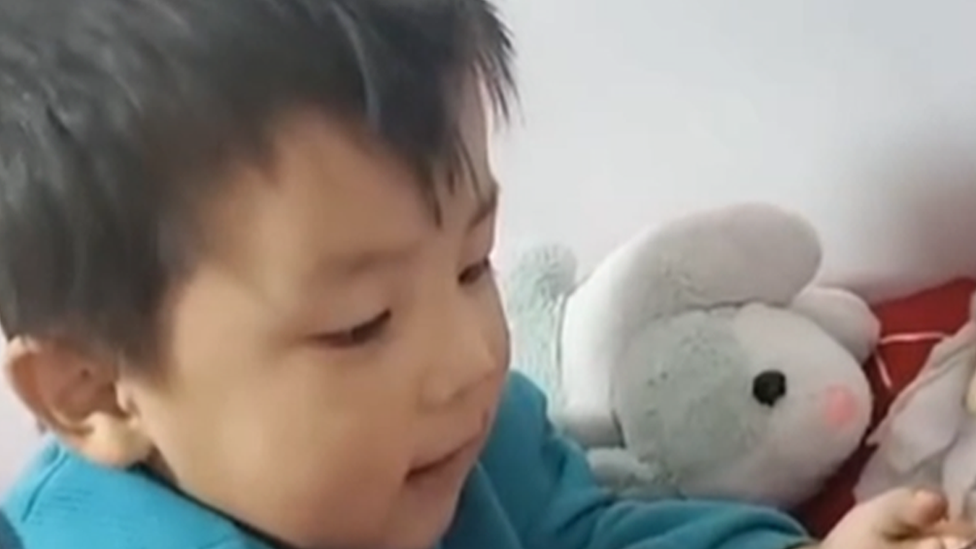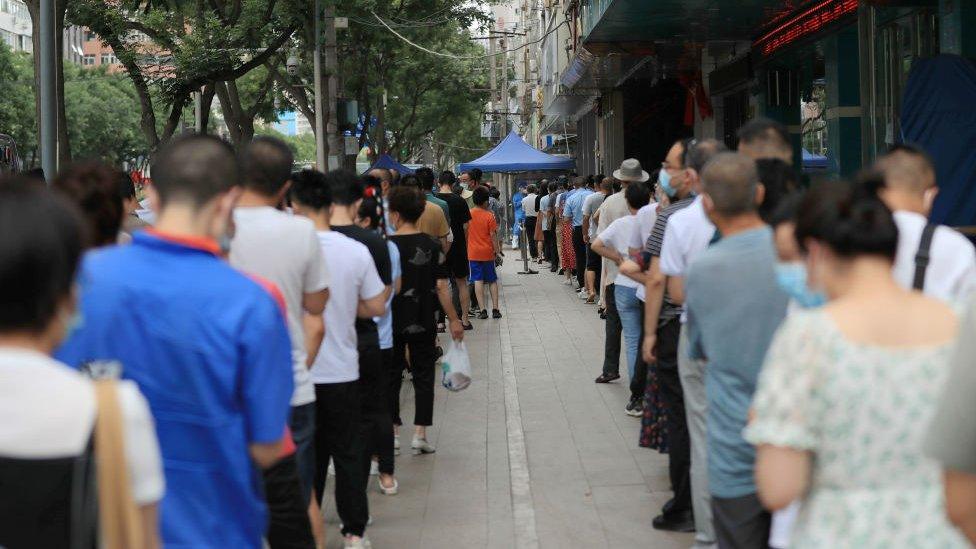China Covid: Lockdown delayed potentially lifesaving treatment for sick boy, father says
- Published

Wenxuan's death has provoked anger in Lanzhou and on social media
A Chinese father has told the BBC how a lockdown in his city delayed potentially life-saving treatment for his three-year-old son who had become ill after a suspected gas leak.
The boy's death in Lanzhou in western China on Tuesday has provoked intense anger locally and on social media.
Local police say they responded immediately to an emergency call.
But Tuo Shilei told the BBC that he could not get his son out of their residential compound for over an hour.
The area has been under lockdown since the beginning of October, residents told the BBC.
"My son's cause of death was an accident, but during the whole process of our call for help, there was avoidance of responsibility and dereliction of duty. The pandemic control went too far," said Mr Tuo.
On Tuesday evening furious residents took to the streets. Videos sent by locals to the BBC show police officers deployed to the neighbourhood. In one video, a man could be seen being dragged and kicked by a group of men in black uniforms.
"The three years of the pandemic was his whole life," one woman is heard shouting at the line of police in the footage.
"The Communist Party is just awesome!" a man shouts sarcastically in the same video.
On Thursday the city authorities ordered officials to be more flexible in how they deal with people when enforcing epidemic controls in the city in response to the boy's death, state media reported.
The municipality also released a detailed account insisting that emergency services had responded quickly but also admitted some failings.
The ambulance never arrived
At about noon on Tuesday Mr Tuo's wife used LPG gas to boil water and warm up the room, then went into the shower.
Shortly after, he heard a huge thud. He rushed into the room and found his wife struggling to stand up. He turned off the boiler first, carried her to the bed, and started performing CPR.
After his wife's status improved, he soon found that his son Wenxuan who was sleeping had lost consciousness. Despite receiving CPR, the three-year-old remained unconscious but was still breathing.
Mr Tuo sent a message to the local community management team asking for an ambulance. Then he rushed to the Covid checkpoint near their building and asked the two staff there for help. One said they didn't have a cellphone, the other asked him to talk to the community management team.
They also asked him whether he had a recent PCR test result, he says, which he didn't have.
Then he dashed home to his son, and other residents were coming to help. At this point, he said, his son could open his eyes.
They carried the boy outside and found the Covid checkpoint staff had left. After making numerous calls for an ambulance and waiting for about an hour, he decided to break the barrier at the checkpoint and took his son out.
An ambulance only arrived after they left.
Wenxuan died shortly after 15:00, at a hospital about 10 minutes drive from his home.
Public anger
The local police department released a statement late on Tuesday saying they received a call regarding this incident at 13:43. The police helped send the two people to the hospital 13 minutes later, it said. Police said the child had died from carbon monoxide poisoning.
But this did little to alleviate public anger over what they said was a slow response by epidemic control staff and paramedics. By Wednesday evening topics related to Wenxuan's death had been viewed 800 million times on China's microblogging platform Weibo.
"Even if the police reacted quickly enough, shouldn't there be a thorough investigation about whether any side blocked the father from getting help?" one user wrote under the police statement on Weibo.

Lanzhou has been under Covid restrictions
Mr Tuo meanwhile says police only arrived at their home after his son had been taken to hospital.
Local residents have also told Chinese media that the police arrived after the father and son left, and sent the mother to another hospital.
"Whether the police statement is true or not, people's resistance caused by the pandemic has peaked. All the censorship and coverups have made things worse," another Weibo user wrote.
Mr Tuo is now demanding accountability. He has been speaking to Chinese media outlets and posting his story online.
"With all the personnel involved, where went wrong? Why wasn't there help in the first place?" he said.
He also fears for his own safety.
According to the Lanzhou local government, 51 non-symptomatic cases were reported in the city of more than four million residents on Tuesday - 29 of them were from Qilihe district, where Mr Tuo lives.